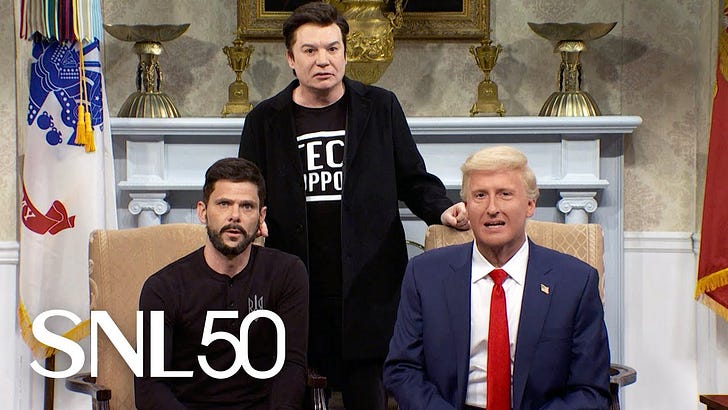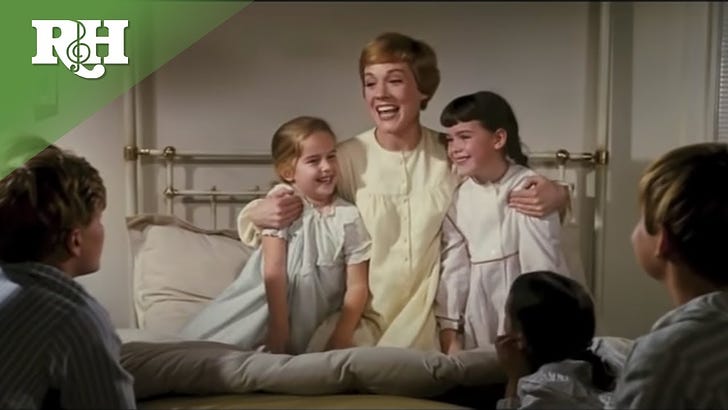Lately, for absolutely no reason whatsoever, I’ve been thinking about what it might be like to live with an iron fist looming over your head. My mind has wandered to the outer realms of sheer fantasy, and encountered the question of what a single person might be willing to endure in order to fight for a better tomorrow. Like I said, real far-out shit.
For numerous reasons having to do with the audience’s willingness to suffer discomfort and uncertainty, American popular culture has had surprisingly little to say about the enduring reign of Donald Trump. Unsure of how to depict the conjoined menace and foolishness of the last decade, film and television have mostly bypassed attempting to document our shared political and cultural reality. So it comes as a real surprise that one of the few television series to do so, and do it exceedingly well, streams on Disney+, and is set—huh?—in the Star Wars universe.
For our purposes, it might be more worthwhile to think of Andor as a Tony Gilroy series rather than a Star Wars show. Like Gilroy’s Michael Clayton, Andor is a stitched-together montage of tense meetings and brief, fraught encounters between harried professionals occasionally dotted with brilliant action, like the protest-turned-massacre in “Who Are You?” We watch as the first sparks of rebellion—scheming merchant Luthen Rael (Stellan Skarsgard), pilot and spy Cassian Andor (Diego Luna), senator Mon Mothma (Genevieve O’Reilly), and numerous others—begin to dance in the air.
It is about the inevitability of moral compromise in the pursuit of moral rigor, and the cruelty doled out in the name of a larger kindness. Andor is a single question repeated ad infinitum, posed to each character repeatedly and persistently: “Can you carry on?”
Andor is a series about armed rebellion that is less about ultimate triumph or righteous violence than it is about pain and loss. Resistance is not romantic or grandiose, although it can be beautiful at times. Everyone masters, to borrow a phrase from Elizabeth Bishop, “the art of losing.” “We fight to win,” a younger Luthen tells his surrogate daughter Kleya (Elizabeth Dulau) in what might serve as Andor’s rallying cry. “That means we lose—and lose and lose and lose—until we’re ready. All you know now is how much you hate. You bank that, you hide that, you keep it alive, until you know what to do with it.”
Luthen is an ambiguous figure in Andor, a consummate self-declared liar and trickster, yet he is also the beating heart of the rebellion, who holds on to its promise when others give way to despair. Cassian, too, offers that gift to others, in ways he can only dimly grasp. Late in the second season, a healer touches his ailing shoulder, and takes away her hand with a look of gratitude, thanking him for a feeling she had not experienced in a very long time: “Clarity.” She tells Bix (Adria Arjona) of her partner Cassian that where most people simply accrue their experiences, “some very few—your pilot—they’re gathering as they go. There’s a purpose to it. He’s a messenger. There’s someplace he needs to be.” This is a nod, of course, to developments already familiar from Rogue One, but it is also a perfect description of what a good political organizer does. Everything is gathered for a reason. Every step is one taken in the direction of a victory that might be too distant to glimpse yet.
Resistance is an act of loyalty to one’s comrades, mentors, and friends, and sometimes requires holding strong even when others waver. In the remarkable, unbearably tense episode “Make It Stop,” Kleya dons hospital scrubs and smuggles her way into the hospital where Luthen is being held, sneaking or shooting her way into his inner sanctum so she can pay him the ultimate tribute: allowing him to die in silence. Rebellion is about all that is not said, not honored, not remembered.
Everyone loses. They lose parents, friends, lovers. They lose their belief in a better day to come. They lose the energy to carry on. This second and final season of Andor is structured in four three-episode blocks, each taking place one year after its predecessor. This allows for the passage of time, and for a kind of heavy, draining anomie sitting atop each character’s shoulders like a woolen cloak. The struggle never ends, never gets easier, never relents. Andor is about each of those moments of decision in which its characters must recommit to the cause. A lifetime of effort is made up of a lifetime of singular decisions to stay.
The rebellion requires all kinds. It requires the oily Luthen, the elegant senator Mon Mothma (Genevieve O’Reilly), who emerges from her cocoon to denounce the emperor, and the ferocious Bix. It also requires all manner of sacrifice. Stemming from a film trilogy with a child’s romanticized vision of collective action, Andor is acrid with the stench of uncertainty and discomfort. Its characters are not always ennobled by their cause. Instead, they must endure, one second after another, in pursuit of an ideal that remains forever amorphous.
Each of these radically differing figures is dependent on each other. Some fight with weapons and others with words, but no one can operate independently. Cassian gets Mon Mothma to a safe house, where the reality of what has been done to keep her safe belatedly sinks in. “I’m not sure how to thank you,” she tells Cassian. “Make it worth it,” he responds.
In the final episode, “Jedha, Kyber, Erso,” water is everywhere: incessant rain, a relentless drip falling into an overturned tin can, Cassian lovingly watering his plants before proceeding to the mission for which he has been training his whole life, the place it turns out he has needed to be all along. Cassian strides through the lush growth of the forest on the way to his rendezvous with destiny, and the visual metaphor clicks into place. A forest grows one drop of water at a time.
The drops sometimes fall from the sky, and sometimes are coaxed out, as when Mon Mothma at last drops her guise and declares herself openly for the Rebellion. She is granted the words that seem to address our own authoritarian conundrum most closely. “The distance between what is said,” she argues, “and what is known to be true is an abyss.” The senator goes on to point out that “the loss of an objective reality is perhaps the most dangerous.” We are perhaps now in a galaxy not quite so far away from where we had started out.
The earlier arguments about Luthen are disputes about the ownership of a forest. Is it the people living in it now, or the ones who planted the seeds? It ultimately does not matter. Collective action requires that everyone tamp down that oh-so-human desire for credit and work selflessly on behalf of ideas that are common property.
“Freedom,” we hear an offscreen voice tell us in the final episode, “is a pure idea. It occurs spontaneously and without instruction.” Andor’s characters are simply the shoots that grew when a seed fell in fertile ground. A prequel to a prequel, Andor is a story whose final resting place is already known. It could easily have felt sterile, as so many prequels often do, but it chooses to leave us with two visions of what we might call a new hope. Kleya stands in the doorway of her hut, watching as the necessary materials are carried past her for Cassian’s mission. Her work, which has lasted her entire life, and required that she risk her life to kill her own adoptive father, has set larger wheels in motion. And Bix, now back on her home planet, stands in a lush field of wheat, clutching a baby in her arms. Old stories end, and new stories begin. And we are defined by our commitment to what we love, whether it is freedom or new life.
Andor leaves us with a message resonant for our own unsettled time: freedom means that there should be no emperors. We might even say “No kings.”
Like what you’re reading? Support our work by subscribing or upgrading.
More Kinda Political Reads:
Elbows Up
Being alive and cognizant of the world in 2025 is disconcerting and baffling and tragic in more ways than I can currently enumerate, but perhaps one fundamental shift that we are all struggling to take in is the collapse of much of what had once been our intense ideological differentiation. The only real political argument that matters right now is not …
Why We Need 'The Sound of Music' More Than Ever
As the classic musical film turns 60, we could all use a little more of our favorite things, Nazi-flag-ripping, and "Edelweiss."
The TV Series That Predicted a Second Trump Term
If you’re having anything like the week I’ve been having (and I hope, for your sake, that you aren’t), you have been oscillating between poring over every stray bit of news and analysis on the internet, and finding all of it indigestible, like a lavish meal served just after you finishe…










A fascinating and inspiring read, even for those of us who haven't watched Andor!